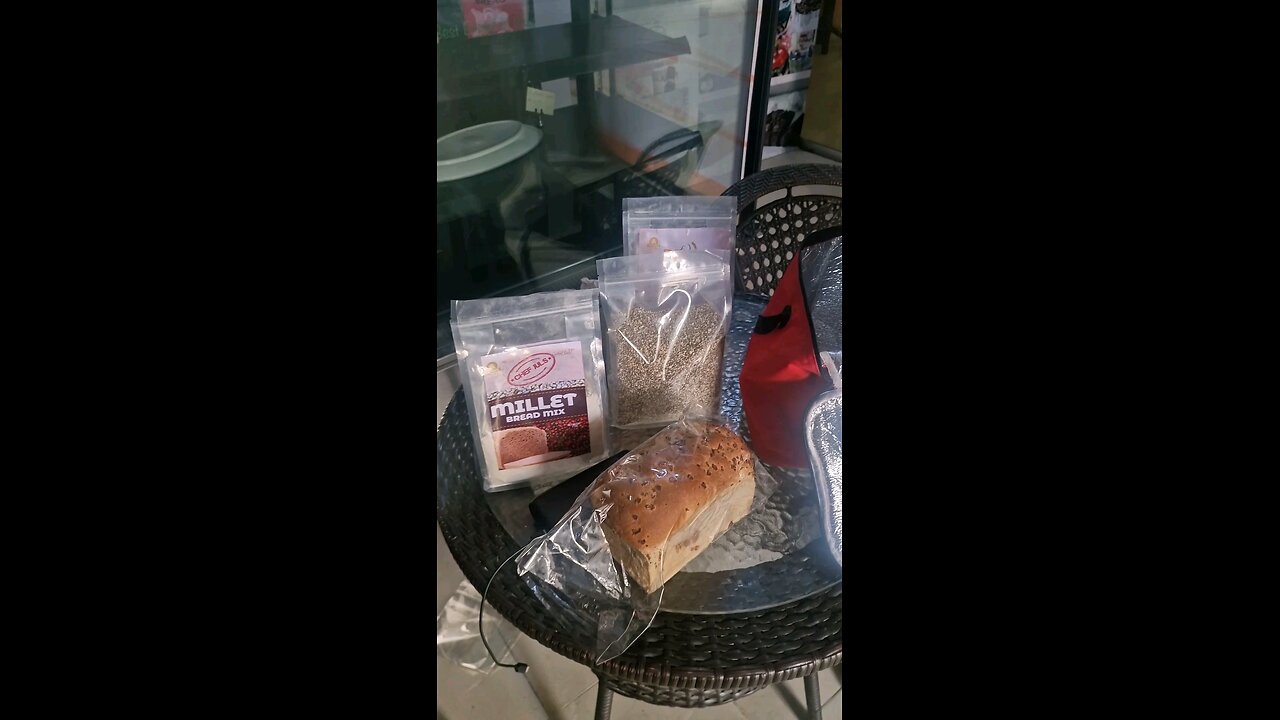Premium Only Content

Domestic Grains Initiative by Juliet Aigbe (Chef Juls)
Afro-Centric solutions based on our African granaries.
What brought about the Millet Flour Initiative:
98% of wheat grains consumed for bread production – Nigeria’s national staple is imported and with high
foreign exchange, it has become increasingly difficult to nourish the average family on a humble budget.
As a seasoned multiple award winning baker and recipe developer at Bourffe Bakeries, Chef Juls (Juliet Aigbe) extended her curiosity from baking to include backward integration of Millet grains from the source of its value chain and founded Domestic Grains Initiative (DGI) to tackle the supply chain gap.
DGI solves this problem by sourcing millet grains from farms and developing a composite trail mix of millet and other flours through processing and milling from scratch. Millet is high in micronutrients, rich in antioxidants, and contains 6 times more fibre than 100% wheat-based meals. So far, through small holder farmers in the savannah regions of Nigeria (Jigawa, Katsina and Kaduna States) and using Climate Smart Agricultural practices, we are aggregating the abundantly available grains and tranforming them into flours for the confectionery industry and beyond.
With our committed all female team members, we’ve been able to produce over 10 tons of Millet flour since we first launched out in August 26th 2022, both for other bakeries and our own in-house bakery where we produce over 200 Millet bread loaves weekly for members of our immediate community.
In 2023, We won the award for most Innovative Bakery by Top Baker Nigeria for introducing millet in our baked goods product offering, and our #bakewithmillet campaign is reaching more bakeries!
Why Millet
Millet is a grain belonging to the Poaceae family, commonly known as the grass family. It is gluten-free, high protein, fibre, and rich in antioxidants. The most popular type is called pearl millet, and it’s abundantly available in the savannah regions of sub-Saharan Africa, including Kwara, Niger, Kogi, JigawaKatsina and Kaduna States of Nigeria.
Africa’s rich array of domestic grain options extends to other great alternatives like manioc flour (cassava), soy beans, and ofada rice amongst a vast array of grains.
After several test baking and trials and errors, a winning recipe by Chef Juls emerged and was shared with a syndicated group of Lagos bakers, forming the foundational members of DGI community We have had several consultations with stakeholders in the industry to introduce millet as a viable, sustainable option as a composite traill mix for our national staple.
“THE DOMESTIC GRAIN INITIATIVE isnt just introducing the grain to our local consumers, we want to encourage them to re-engineer their palates around our own readily available grains so more and more of our domestic grain options can find their way back to our tables and ultimately elevating the hierarchy of value attached to our grains.
The idea of embracing our “low hanging fruits” option through a trail mix of millet and other flours in bread production will not only keep the price of bread affordable, but will advantageously nourish our communities and encourage more backward integration interventions.
The Goal Of Our Domestic Grains Initiative Is To:
Design Innovation for Bread: In support of MDG 8: A hybrid grain option will help improve global partnership for development
Food Safety Practice: More nutritive alternative to traditional commercial bread will help prevent malnutrition
Market Connectivity – In support of MDG 1, which is to eradicate extreme poverty and hunger as millet is readily available and affordable by low income communities.
It’s time to change the narrative about bread!…
” Wheat flour, the major ingredient for making local staple is derived from a temperate grain not grown originally in Africa, which means we source our daily bread from an imported grain. As stakeholders in the wheat value chain, we are deconstructing this co-dependency and encouraging our hardworking Nigerian bakers to start taking ownership of the source of our bread value chain by adopting a hybridization approach. let’s reconstitute this important staple with our domestic grains.”
We need to re-engineer our palate folks!
This is how we revive our economy…”
– Chef Juls
Bourffe Bakeries Ltd
-
 2:26:11
2:26:11
Jewels Jones Live ®
2 days agoWINNING BIGLY | A Political Rendezvous - Ep. 108
153K46 -
 2:04:49
2:04:49
Bare Knuckle Fighting Championship
4 days agoBKFC FIGHT NIGHT MOHEGAN SUN FREE FIGHTS
79.5K7 -
 25:09
25:09
BlackDiamondGunsandGear
15 hours agoYou NEED to be Training For Whats to Come
54.7K11 -
 20:03
20:03
Sideserf Cake Studio
21 hours ago $1.88 earnedA HUNGRY HUNGRY HIPPOS CAKE THAT ACTUALLY WORKS?
50.6K14 -
 23:51
23:51
marcushouse
22 hours ago $1.74 earnedStarship’s Next Move Is Coming Sooner Than You Think!
37.2K7 -
 22:24
22:24
The Finance Hub
1 day ago $12.10 earnedBREAKING: JOE ROGAN JUST DROPPED A MASSIVE BOMBSHELL!!!
40K37 -
 55:02
55:02
PMG
17 hours ago $1.03 earnedHannah Faulkner and Miriam Shaw | Moms on A Mission
27.9K1 -
 1:21:05
1:21:05
I_Came_With_Fire_Podcast
1 day ago"Veteran Health, Military Culture, and American Exceptionalism" with Matt Kenney
94.5K21 -
 23:21
23:21
Simply Bitcoin
1 day ago $37.60 earned$1M Bitcoin in 2025? | Trump's Plan to End the Fed Revealed!
183K73 -
 17:19
17:19
SLS - Street League Skateboarding
17 days agoTop Moments from the Men’s Super Crown Final! Nyjah Huston, Giovanni Vianna and Gustavo Ribeiro 👑
101K1